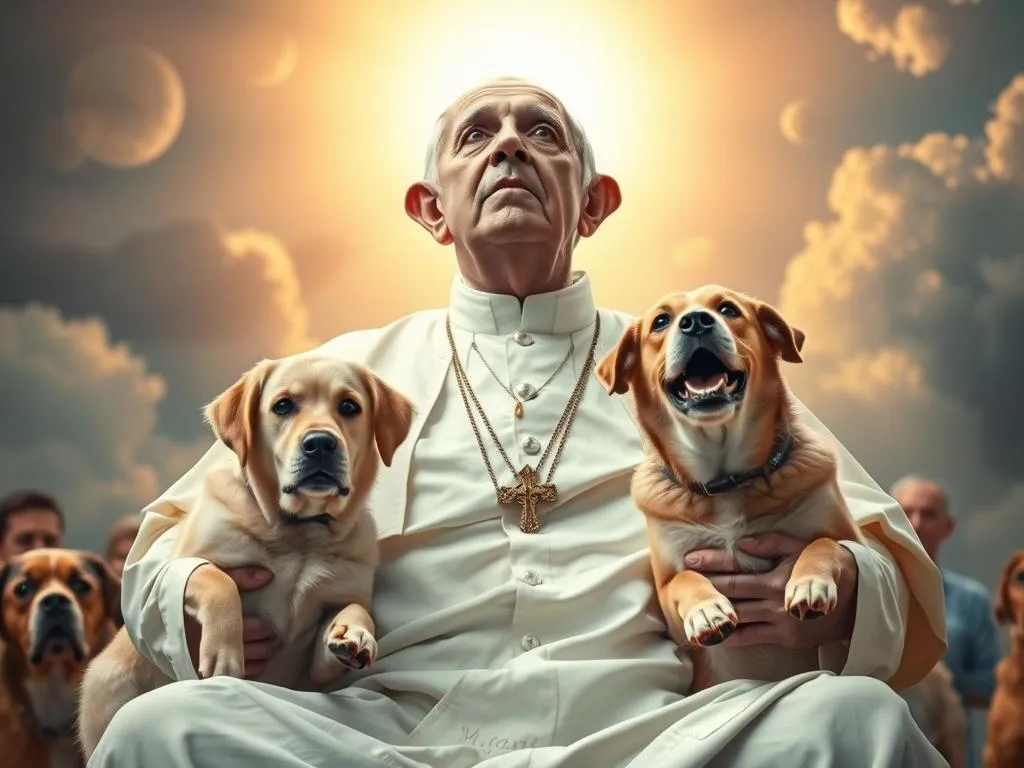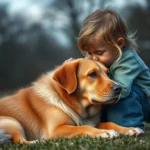
The phrase “dogs go to heaven” has been a source of fascination and comfort for pet lovers around the world. Recently, this topic gained renewed attention when Pope Francis made a statement that seemed to affirm this cherished belief. The significance of the Pope’s remarks cannot be understated, especially as they touch upon themes of spirituality, love, and the connection between humans and animals.
Understanding the context and implications of the Pope’s statement is essential, not just for the faithful but also for those who hold their pets dear. This exploration dives into the theological perspectives, public reaction, and personal reflections surrounding the idea that our beloved canines may indeed have a place in the afterlife.
Context of the Statement
Background on the Pope’s Views on Animals
Pope Francis has long been an advocate for the welfare of animals. His papacy has been marked by a compassionate approach toward creation, emphasizing the importance of caring for all living beings. Early in his tenure, he established the “World Day of Prayer for the Care of Creation,” which reflects his commitment to environmental and animal welfare.
The Pope has made various statements about animals, often highlighting their role as companions and friends. He has noted that animals can teach us about love and loyalty, reinforcing the idea that they are not merely possessions but integral parts of our lives. This compassionate stance set the stage for the remarks that would later ignite discussions about the eternal fate of pets.
The Origin of the Quote
The quote that sparked much discussion emerged during a conversation with a young boy who was grieving the loss of his dog. The Pope reportedly reassured the boy, saying that “Paradise is open to all of God’s creatures.” While this statement did not explicitly say that dogs go to heaven, it certainly implied a welcoming attitude toward animals in the afterlife.
The context of this statement matters greatly. The Pope was speaking to a child in a moment of vulnerability; his words were meant to provide comfort rather than to outline official Church doctrine. This nuance is essential to understanding the potential misinterpretations that arose following the event.
Theological Perspectives
Catholic Teachings on Animals and Afterlife
Traditionally, the Catholic Church has maintained that animals do not possess immortal souls like humans. The Catechism of the Catholic Church states that animals are part of God’s creation, but it leaves the question of their afterlife somewhat ambiguous. Most Catholic doctrine emphasizes that the afterlife is reserved for human beings, who are created in God’s image and are capable of making moral choices.
However, many theologians argue that this does not preclude the possibility of animals existing in some form in the afterlife. Some interpretations suggest that God’s love extends beyond humanity and that the joy of heaven could include the presence of beloved pets. This perspective aligns with the Pope’s compassionate approach, suggesting that God’s mercy may encompass all creatures.
The Pope’s Statement within Catholic Doctrine
The implications of the Pope’s statement have led to various interpretations within the Church. While some see it as a softening of traditional beliefs, others argue it reflects a deeper understanding of God’s love for all creatures. The Pope’s remarks resonate with many believers who have a profound emotional connection with their pets, offering hope that their bonds could transcend death.
Theologians have weighed in, with some emphasizing that the Pope’s words should be seen as an expression of pastoral care rather than a formal declaration of Church doctrine. This distinction is crucial for understanding the significance of the statement within the broader context of Catholic teachings.
Public Reaction and Media Coverage
Social Media Buzz
Following the Pope’s comments, social media erupted with a mix of joy, skepticism, and curiosity. Many pet owners took to platforms like Twitter and Instagram to share their thoughts, often accompanied by heartwarming photos of their dogs. Hashtags like #DogsInHeaven began trending as people shared personal stories of their pets, fostering a sense of community among animal lovers.
Viral posts included anecdotes about pets who had passed away and the impact they had on their owners’ lives. For many, the Pope’s statement provided a comforting narrative that their furry friends would be waiting for them in the afterlife, leading to a flood of emotional responses.
News Coverage
Media outlets around the world picked up the story, reporting on the Pope’s statement with varying degrees of interpretation. While some articles celebrated the notion that dogs go to heaven, others focused on clarifying the Pope’s actual words and the context in which they were delivered. This discrepancy in coverage highlights the challenges of accurately conveying spiritual messages in a world driven by sensationalism.
Public reception varied, with some praising the Pope for his compassionate view and others critiquing it as a departure from traditional doctrine. The discourse that followed revealed a deep emotional connection many have with their pets, underscoring the importance of the relationship between humans and animals in contemporary society.
Broader Cultural Implications
The Role of Pets in Modern Society
In recent years, pets have increasingly taken on significant roles within families and social structures. They are often viewed as family members, providing companionship, emotional support, and unconditional love. This shift in perception has led to a rise in pet ownership, with many households considering their pets as integral to their well-being.
The psychological impacts of pet ownership are well-documented, with studies showing that pets can reduce stress, anxiety, and feelings of loneliness. The idea that dogs go to heaven reinforces the emotional bonds formed between humans and their pets, providing solace in times of grief and loss.
Pets and Spirituality
The integration of pets into spiritual practices reflects changing beliefs about the afterlife and the nature of existence. Many individuals now incorporate their pets into rituals, such as prayer or meditation, emphasizing the idea that animals are spiritual beings deserving of love and respect.
This connection between pets and spirituality can manifest in various ways, from memorial services for deceased pets to the belief that animals serve as guides or protectors in the afterlife. The notion that pets might accompany us into eternity resonates deeply with those who view their relationships with animals as sacred.
Personal Reflections and Anecdotes
Stories from Pet Owners
Across the globe, countless pet owners have shared their beliefs about animals in the afterlife, often recounting emotional experiences that have shaped their views. A common thread among these stories is the deep bond that exists between humans and their pets. Many individuals describe their pets as family members who provided unwavering support during challenging times.
One touching story came from a woman who lost her dog, Bella, after years of companionship. She recounted how Bella had been there for her during her toughest moments, providing comfort and love. After Bella’s passing, the woman found solace in the belief that her dog was now in a peaceful place, waiting for her. This story, like many others, highlights the profound impact pets have on our lives and the comfort that belief in an afterlife can provide.
Philosophical Reflections on Life and Death
The relationship between humans and animals raises philosophical questions about life, death, and existence. The bond we share with our pets often prompts reflections on love, loyalty, and the nature of the soul. Many people find themselves contemplating what it means to truly live and how the love we give and receive from animals enriches our lives.
These philosophical musings often influence lifestyle choices, leading individuals to prioritize compassion, empathy, and kindness in their interactions with all living beings. The belief that dogs go to heaven serves as a reminder of the love that transcends physical existence, encouraging a deeper appreciation for the connections we forge in life.
Conclusion
The Pope’s statement regarding animals and the afterlife has sparked a meaningful conversation about the role of pets in our lives and the nature of spirituality. While the Catholic Church traditionally maintains a distinction between humans and animals regarding their souls, the Pope’s compassionate approach offers hope and comfort to many.
The theological, cultural, and personal implications of this discussion highlight the changing landscape of beliefs surrounding pets and their place in our lives. As we navigate the complexities of love, loss, and spirituality, the idea that dogs go to heaven continues to resonate with pet lovers, providing solace in the knowledge that our beloved companions may indeed accompany us in the next life.
In a world where the bond between humans and animals grows ever stronger, it is essential to embrace and celebrate the love we share with our pets. As we reflect on our relationships with them, let us remember the joy they bring and the lessons they teach us about compassion, loyalty, and the beauty of life itself.









